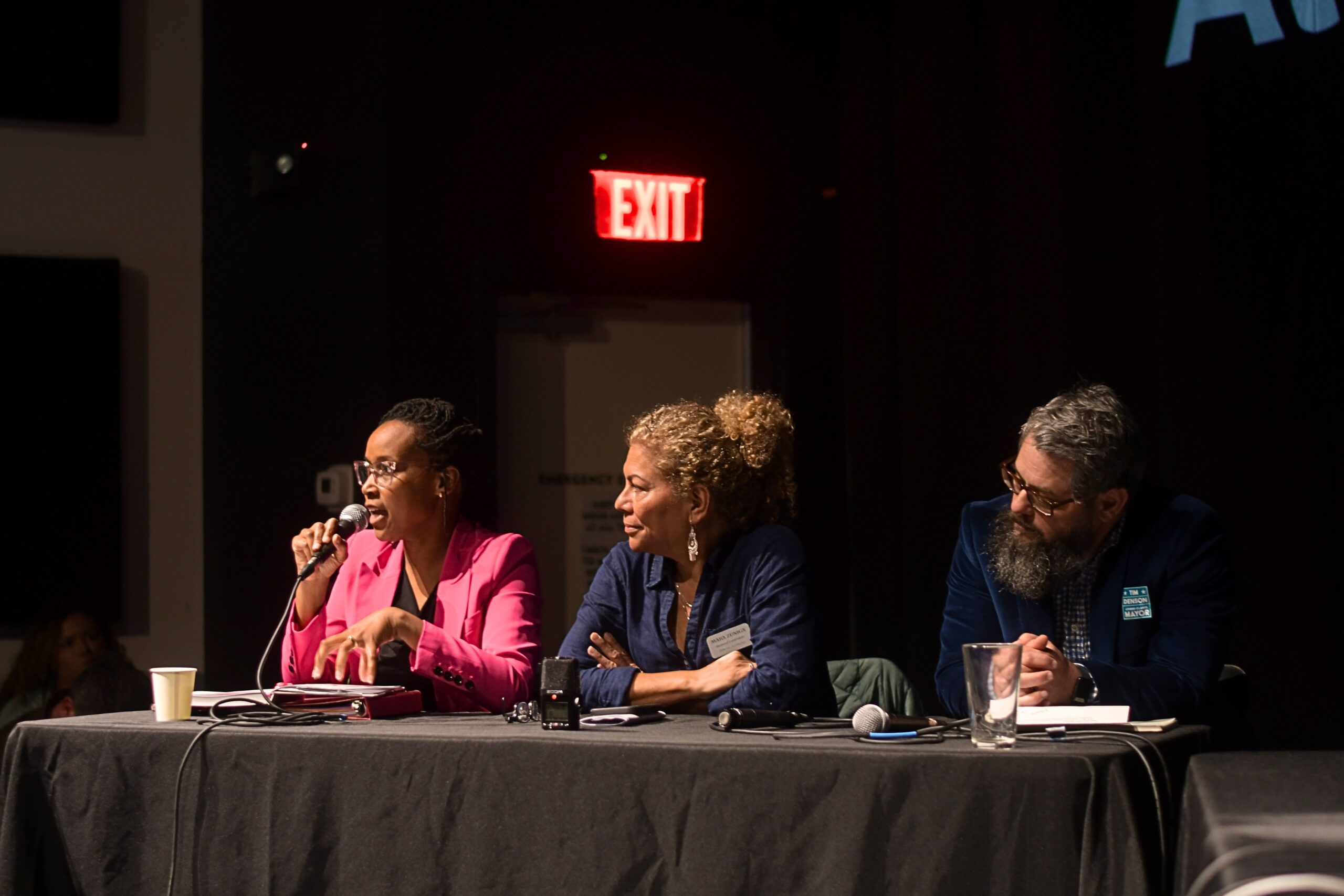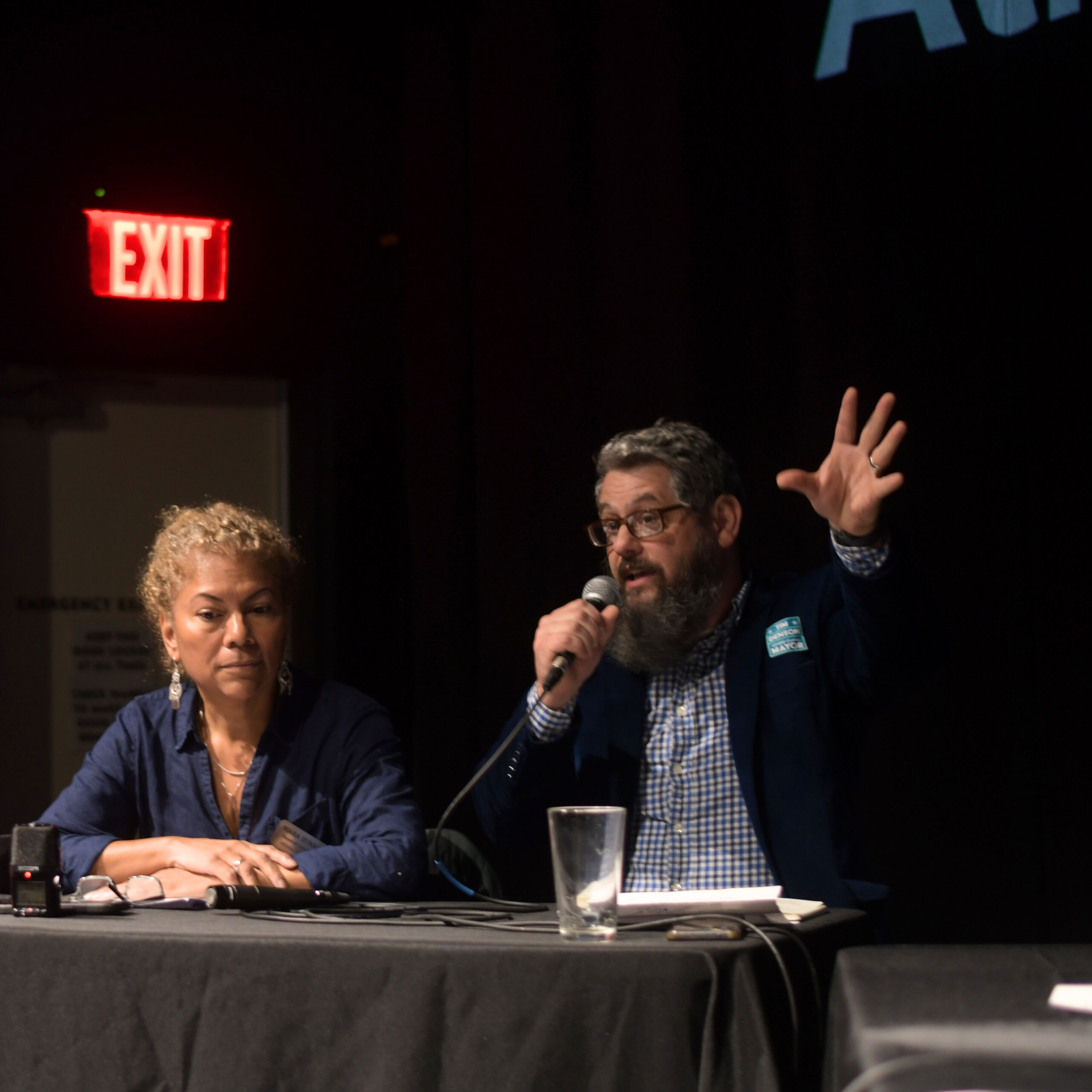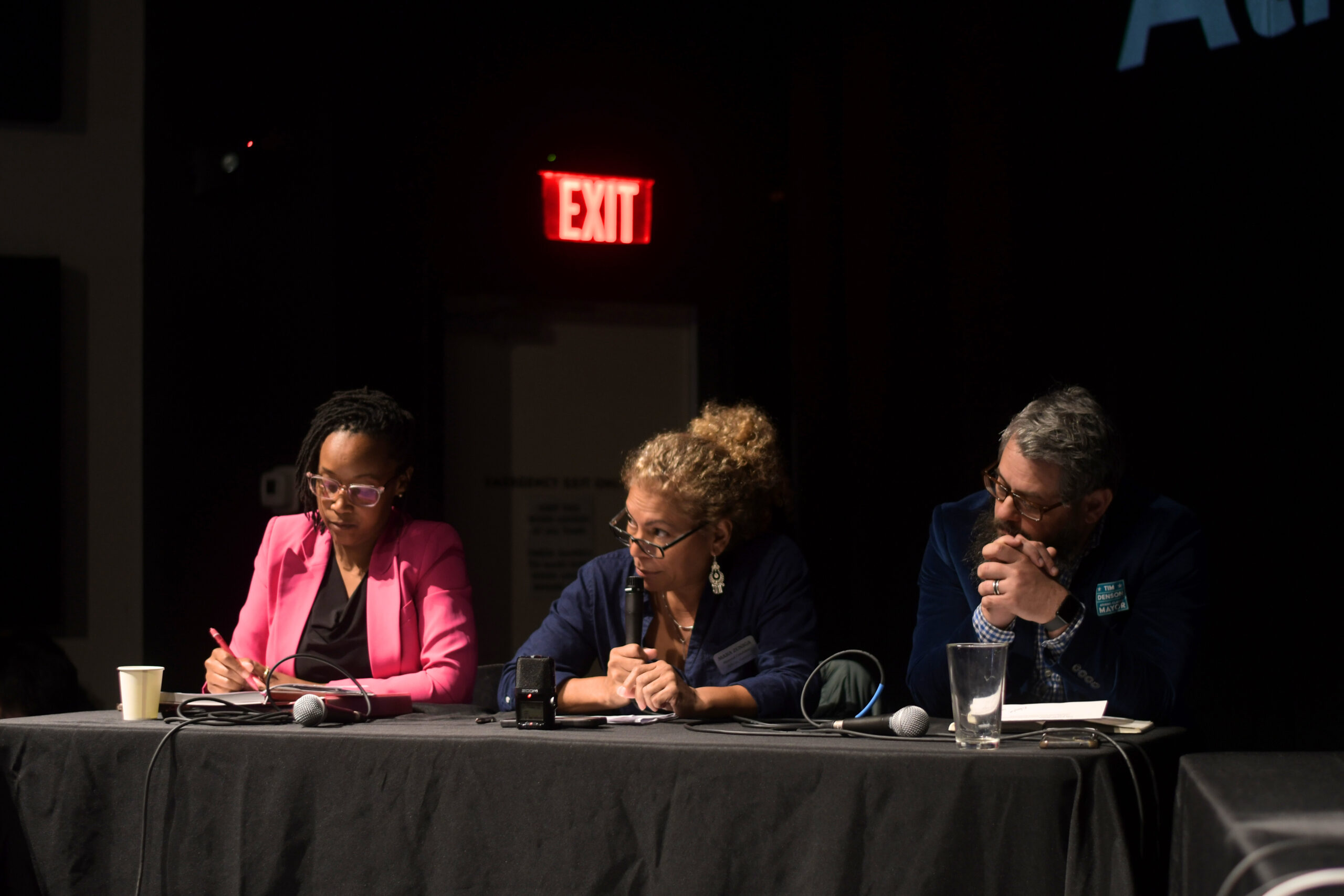
Athens mayoral candidates convene for first debate
As of November, four candidates will vie to become the next mayor of Athens in May 2026: Clarke County School District (CCSD) Board of Education (BOE) member for District 5 and former ACC commissioner Tim Denson, businesswoman and former Treasurer of the ACC Republican Party Mara Zúñiga, District 5 Commissioner and Mayor Pro Tempore Dexter Fisher, and CCSD (BOE) member for District 7 and former CCSD (BOE) president LaKeisha Gantt. Denson, Zúñiga, and Gantt gathered for a debate at Cine on Nov. 8. Fisher was unable to attend due to a medical issue. Co-moderated by AthChat podcast hosts Russell Edwards and Drew Abney, the discussion highlighted topics like homelessness, housing, tax collections and public services such as public transportation.
HOUSING
Edwards’ first question asked candidates how they planned to create more affordable housing in Athens and ensure it was available to everyone. Gantt replied first, urging the need to build more affordable housing communities rather than only a few in each new development. She ended her first remarks by saying that she would utilize local non-profits, implying UGA. In a follow-up question, she acknowledges the complexity of the housing crisis and the need to consider student housing solutions and that accessory dwelling units, such as apartments built into basements and backyards to house additional people on one property, would be a viable option.
“One thing is clear, that building apartment complexes and having only two or three affordable units is not going to impact the need that we have,” Gantt said. “The very first plan is to partner with our local nonprofit institutions that right now are not paying taxes.”
Zúñiga responded next, taking a smaller government approach. She supports an audit of local housing initiatives, with the intent to either reform or end ineffective programs. She also proposed loosening restrictions on manufactured homes to speed up development.
“I’ve dedicated most of my life to helping people obtain homes. I’ll tell you, there’s no greater feeling than when you stand with a person and you prepare them for their first house. It’s a joy. But one thing that I have noticed is that people usually are not prepared for that kind of investment. I’ve spent close to 20 years helping people understand the process and preparing myself for that, so I consider myself to be financially literate,” Zúñiga said.
Denson emphasized his experience, including his service on the Georgia Community Housing Initiative and the Athens Inclusionary Housing Committee. He emphasized the immediate need for more housing, citing a statistic that while the Athens population grew 7% from 2010-2020, housing only grew by 2%. He proposed density as the best solution to the crisis, and would plan to change policy around accessory dwelling units to add population density.
“Density is key. We have to have more density right now. As Russell said, we’re already around 8,000 housing units behind. It is predicted that with our growth trends, by 2040 we are going to have 30,000 additional people here,” Denson said. “If you put that in by the average number of people who are in a household, that means by 2040, on top of those 8,000, we’re going to need 11,197 more units. That’s a lot of units y’all.”
GENTRIFICATION
Abney offered the first question on the topic of gentrification. He asked each candidate how they would balance growth with gentrification should they be elected. Zúñiga started the conversation by expressing concern with Denson’s push for high density growth. Coming from New York, she questioned whether the population growth would be worth the strain on government infrastructure. In her closing statement, she said that her administration would promote managed and planned growth to avoid gentrification and infrastructure strain.
“I have seen gentrification. It doesn’t just happen with vulnerable neighborhoods. It also happens in places like Five Points. You don’t think it happens, but it does,” Zúñiga said.
Denson repeated his call for density. He agreed with Zúñiga about the necessity of smart growth, but argued that density is smart growth as it reduces the amount of sewage lines and other new infrastructure needed for expansion. He said that his plan would involve changing the zoning codes so development is encouraged everywhere, not just in underprivileged areas.
“I would love for us to explore creating districts that would get away from the mixed residential we put in East Athens and on Hancock. Because we actually encouraged gentrification in those areas,” Denson said.
Gantt took a more immediate approach to stopping gentrification. She urged the candidates to consider citizens already living in gentrified areas, and areas like North and East Athens that are at great risk. She made the point that while future Athenians are important, current citizens should always be the priority.
“I don’t want to be insensitive, because I know that there are different reasons that people move here, but I often read reports that say ‘Athens is the best place to retire.’ And that’s all great, but I think we would all agree that we are full. We are full with a lot of different issues and people, and it’s beautiful, but we have to manage what we have,” Gantt said.
HOMELESSNESS
Edwards brought up the ongoing problem of homelessness in the community and questioned the candidates what are some strategies they plan on implementing as mayor to ensure that these individuals can live a life of dignity.
Initially, Denson mentioned that for the last few years he’s been working to get homeless people into homes. He challenged local entities to take up a commitment that they will reduce homelessness in Athens-Clarke County by 50% in the next 10 years.
“Working at the homeless aid service center, we were able to see that programs like Permanent Supportive Housing work, specifically for folks who are facing chronic homelessness, somebody who’s been homeless for a number of years,” Denson said. “My challenge is going to be for this entire community, for UGA, the Chamber of Commerce, the hospitals, the state of Georgia, to join us and to take up a commitment that we will reduce the chronic homeless in Athens-Clarke county by 50% over the next 10 years.”
Gantt stressed the idea of expanding referendum services and mental health services. She mentioned a significant number of homeless individuals have mental health challenges, with individuals also reporting being disabled or fleeing from a domestic violence situation.
“We also saw that there was a good number of people that had become homeless within that past six months, and so I think if we can expand our wraparound services, then we get to the root causes of what may be contributing to that person’s situation,” Gantt said. “You can have a house for a person, you can have a place for a person to live, but until you can begin to address some of those underlying concerns and underlying contributing factors, you have a home and then the person may leave. So it’s possible that those issues are not resolved.”
Zúñiga emphasizes that the problem of homelessness needs to be addressed by speaking with state representatives, not just locally.
“It shouldn’t be a local solution, because they would be only a mandate. I would look for sustainable solutions with the state and the surrounding areas, because I think we need to share those costs,” Zúñiga said. “We can come up with solutions, but they have to be shared. It cannot be solely Athens’ local problem, and I think part of the situation is going to have to be speaking with the state representatives, and you have to be able to sit down and dialog with them.”
EMINENT DOMAIN
Abney acknowledged that the Firefly Trail—a planned 39-mile-trail from Athens to Union Point —has not been completed, as well as the fire station on the East side. In both of these cases, the issue of eminent domain, the government’s power to take private property for public use, arose.
Zúñiga said eminent domain should be used for projects that benefit the whole community. She recommends that people look at detour areas, even if it may be costly for the city, before resorting to using people’s properties. She adds that the city has a spending problem and can’t see them not paying for a detour route instead of going through personal property.
“When you talk about a recreational trail that only benefits a few, and when you take that trail through areas where people are not really going to use that trail, and you’re taking a bit of their property and you’re giving them a market value for virtually not agreeing to having their property taken … That is a problem. So I think that eminent domain has to be practiced when it’s something that benefits the whole society,” Zúñiga said.
Denson emphasized the need to ensure that people are doing things that balance the full community well over what the wants and needs are for a small portion.
“I think this question is more focused on a couple specific examples (such as) the East Side Fire Department and Firefly Trail. This choice not only impacts potentially current property owners, different people, but we talk about building a fire station. It’s the future happening,” Denson said. “That can impact the person who’s driving on Lexington Highway 15 years from now that gets into an accident.”

Gantt highlighted the need for intentional use of eminent domain, as well as the importance of community education and sensitivity in government conversations.
“I think that while it is something that can be used, we need to be more intentional about how we use it,” Gantt said. “When we already know that we’re working with a tool that can be used for good or for bad, it is on the government to have conversations where we educate our community, but also where we are sensitive. We don’t approach those conversations and just say, ‘Well, we can use eminent domain, and that’s what was told to me, and we are also low-balling the people that we’re offering to purchase their land. So we need to improve the process.”
PUBLIC TRANSIT
Denson highlighted the success of ACC zero-fare public transit system and its impact on low-income riders.
‘It’s especially important because a majority of the riders, a lot of times, are low income riders who use that system,” Denson said.” And by having a zero fare system, keeping $1.75 or more in their pocket for every single ride trip they take to the grocery store and grocery store on the way back.”
Gantt suggested expanding public transit but also ensuring safe access to bus stops through sidewalks.
“I do think it’s important to expand public transit. I also think if public transit is expanded but I don’t have a sidewalk to get to the bus, we’re going to have a problem. I also am aware that with the recent report on public transit, there are a lot of areas of improvement and weaknesses as far as that report and the user number that’s been reported,” Gantt said. “These things are great catchphrases, but people need a way to get from point A to point B, and if you cannot do it safely, then it doesn’t really meet the goal that you have.”
Zúñiga questioned the sustainability of free public transit and suggested considering discounts for those who can pay and everybody else can have vouchers but believes it shouldn’t be free.
“I know about what was said about a month ago, so there was a bus week, and there was a lot of propaganda, take the bus, take the bus, take the bus. Now I don’t know if that week made a difference for the ridership. It just happens to be election time, there’s a free campaign to ride the bus, but I would look at what are the expenses? Because we can’t, we don’t have to just look at the ridership. What is it really costing us to maintain free fares?,” Zúñiga said. “There should be a method where we could give discounts to people that can afford to pay the bus and everybody else can have vouchers, but I don’t think they should be free.”

CROSS QUESTIONS
Zúñiga asked Denson and Gantt why they are leaving their position on the CCSD BOE, given the ongoing challenges in improving literacy rates.
Gantt responded to the question by talking about the importance of working on community development to improve children’s education and development. Denson responded to the question by highlighting the impact of poverty on education and the success of programs like Books for Keeps, advocating for policies to address housing and job issues.
Denson questioned Zúñiga’s political affiliation and support in the recent presidential election. Zúñiga mentioned being on the far left when she was young but then she ‘grew up.’ She attributed her political shift to visiting communist nations like Cuba and seeing their living conditions.
“I want to tell you that when I was young, I was on the far left, just like you. I was 19, and I grew up. I grew up because there are different avenues to reach solutions. I know what communism means, although the name has been changed to socialist Democrats. I’ve been to Cuba. I’ve seen how people live there. I’ve been in Nicaragua. So I was on the far left, and now I see how politics work,” Zúñiga said.
Additionally, Denson sought clarification from Gantt about wanting to obtain pilot family payment in lieu of taxes from nonprofits and whether she was also referring to nonprofit service providers, such as UGA and churches. Gantt explains her focus on starting with the University of Georgia due to its insignificant land holdings and community impact.
“I would love to start with the University of Georgia. There are, I think, when we look at the nonprofit service providers, it’s you. I mean, you have an advantage and they’re very small. When you look at the land amount that is occupied, typically payment in lieu of taxes,” Gantt said. “But who I’m starting with, I’m starting with the organization, or the institution that has the most land, that seems to have had the most land, but also where the people are using or the students and families are using the resources in Clarke County.”
Gantt asked Denson about the skills he would bring to the ACC Mayor and Commission to move the county forward, given the current makeup of the body—which isn’t very progressive.
Denson responded to the question by mentioning the unanimous votes on initiatives he supported such as the inclusionary housing zoning ordinance, eviction prevention program and zero fare public training system.
“Whenever I was on the commission, I was able to get unanimous votes for things that I championed, such as the eviction prevention program that we use to actually keep 822 people households in their homes instead of being evicted. That’s how we were able to get the things like the zero fare public training system in place so that folks can get from A to B, whether that be the pharmacy or the hospital or the grocery store or pick up their kitchen,” Denson said.



